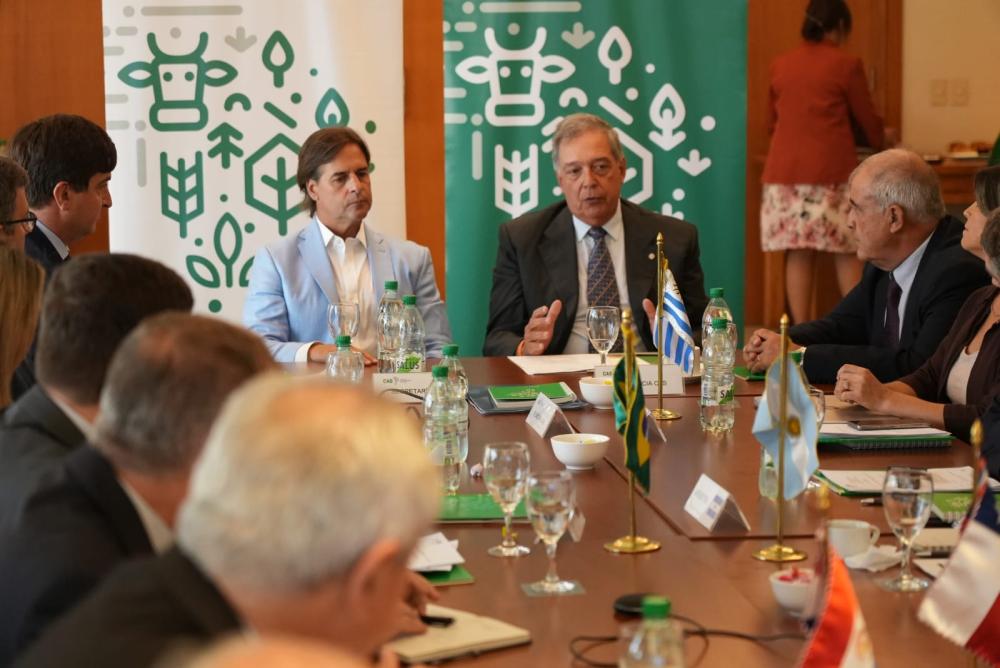The Ministers of Agriculture of Mercosur, Chile and Bolivia, accompanied by the President of Uruguay, have urged rich nations to fulfill their assistance commitments because of the brutal drought that has affected food production

Colonia, Uruguay, 17 March 2023 (IICA). At a meeting of the Southern Agricultural Council (CAS) attended by the Uruguayan President, Luis Lacalle Pou, the ministers and secretaries of agriculture of Argentina, Brazil, Chile, Paraguay and Uruguay have highlighted the fact that the continuing drought in the region is impacting the agriculture sector and, as a result, the wider economy and people’s wellbeing.
They have therefore called on developed countries to fulfill the commitments to assisting developing countries –and especially the agriculture sector– they assumed under the international climate change agreements.
President Lacalle signaled his political support for the CAS by participating in the meeting of ministers, which took place in the Uruguayan city of Colonia del Sacramento, and underscoring the significant progress that the countries of the region have made in balancing food production with environmental care. It was the first time that a head of state had taken part in a meeting of the CAS.
The meeting was attended by the Secretary of Agriculture, Livestock and Fisheries of Argentina, Juan José Bahillo; the Minister of Agriculture and Livestock of Brazil, Carlos Baqueta Fávaro; the Minister of Agriculture of Chile, Esteban Valenzuela; the Minister of Agriculture and Livestock of Paraguay, Santiago Bertoni; the Minister of Livestock, Agriculture and Fisheries of Uruguay, and pro-tempore president of the organization, Fernando Mattos; and the Director General of Planning of Bolivia’s Ministry of Rural Development and Land, Dedy González.
The private sector was also represented at the meeting by officials from the Mercosur Federation of Rural Associations (FARM) and the Confederation of Family Farmers’ Organizations of the Expanded Mercosur (COPROFAM), while the Director General of the Inter-American Institute for Cooperation on Agriculture (IICA), Manuel Otero, participated virtually.
The CAS, the ministerial forum for consultation and the coordination of regional actions, is made up of the ministers and secretaries of agriculture of the countries mentioned above. Its remit is to define the priorities of the agricultural agenda and adopt common positions on issues of regional interest.
IICA, committed as it is to its mission of facilitating collective action and increased integration of the countries, operates the Executive Secretariat of the CAS. The Institute’s Representative in Brazil and Coordinator of the Southern Region, Gabriel Delgado, is in charge of the secretariat, while administrative matters are handled by the Representative in Uruguay, Rodrigo Saldías.
Agriculture’s vulnerability to climate change
In one of the declarations approved at the meeting, the CAS pointed out that the ongoing drought in the region, which has already lasted three years, is the worst since 1994. The fact that the situation is directly impacting food production has global implications, since the CAS countries are some of the world’s biggest producers.
The ministers emphasized that international assistance is needed to tackle the situation: “The developed countries have a historic responsibility to tackle climate change, acknowledged in all international forums and reflected in a commitment to provide funding for the actions of developing countries aimed at both adaptation and mitigation, but that commitment has only been partially fulfilled so far,” the declaration states.
Furthermore, the ministers and secretaries of agriculture of the member countries pledged to continue promoting the development of sustainable practices and technologies and, in particular, to disseminate already existing, effective regional technologies that make production systems more resilient and facilitate adaptation to climate-related challenges such as the current drought. They will do so by allocating resources and undertaking joint efforts as part of public policies that enable them to tackle the challenges involved.
Response to the outbreak of bird flu
The ministers also ratified a resolution adopted by the Southern Cone’s Standing Veterinary Committee (CVP), which earlier this month issued a warning about the spread of highly pathogenic avian influenza (HPAI) in CAS/CVP countries, with new outbreaks detected among wild and domestic birds, as well as in marine mammals.
They added that precautions must continue to be taken to prevent the disease from spreading to commercial poultry farms in the countries of the region, in order to preserve foreign markets and reduce food safety risks.
Finally, the ministers declared of interest the incorporation of new technological tools, in particular the “electronic phytosanitary certificate,” or ePhyto, designed to enhance the transparency and safety of trade in the region, as well as environmental care.
In doing so, they noted that ePhyto, a tool whose development was fast-tracked during the pandemic, also helps to minimize the logistical complications involved in exporting foodstuffs. The system facilitates the supplying of markets, makes it easier for food products to enter those markets, and ensures and improves the flow of international trade, since unnecessary delays are avoided, even in times of crisis.
In his comments during the meeting, Manuel Otero expressed solidarity with the producers affected by the drought, and stressed that the only way to strengthen agri-food systems was by increasing public-private linkages.
The IICA Director General announced that in May the Institute would be launching an action plan to assist the region in developing integrated water resource management systems, based on the principle that food security depends on agriculture and agriculture depends on water.
He also informed the meeting that IICA would be taking part, together with the countries of the Americas and the private sector, in the United Nations Climate Change Conference in Dubai (COP 28), following the success of the pavilion installed at COP 27.
“Agriculture must be included in the environmental negotiations. We have to call for more funds for adaptation, and make our voice better heard. Thirteen ministers of agriculture from the Americas attended the COP 27, and we hope that more will take part in COP 28. It is the ministers who determine IICA’s agenda, and we need to transform it with technical cooperation actions,” he concluded.
More information:
Institutional Communication Division.
comunicacion.institucional@iica.int